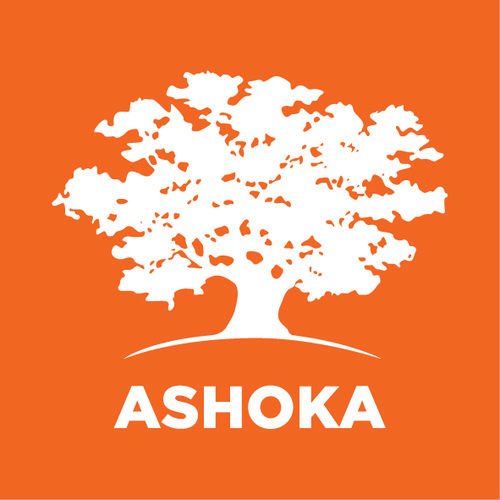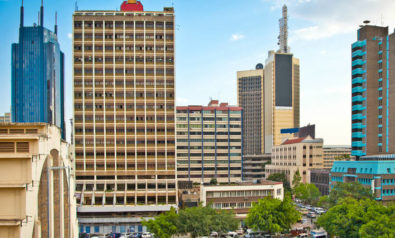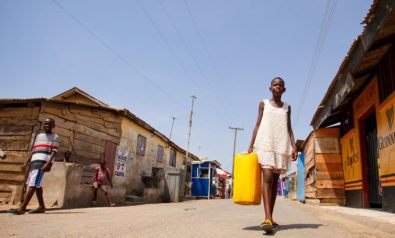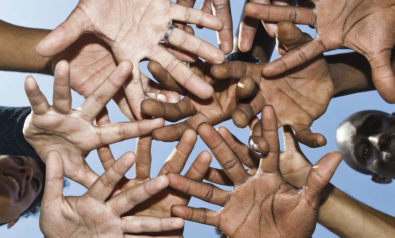The lack of access to gainful employment is a cause of frustration and disappointment for many young people in Kenya.
Vickie Wambura Wamonje is the founder of Nafisika Trust, a prison rehabilitation program that seeks to reduce recidivism rates among prison inmates in Kenya. She was elected an Ashoka Fellow in 2013 in recognition and support of her work as a leading social entrepreneur with an innovative solution to youth employment in Africa. In this interview with Ashoka, Vickie discusses the relationship between incarceration and youth unemployment in Kenya.
Ashoka: Tell us about some of the young people who are drawn to Nafisika Trust: Where do they come from? What are their families like? What are their aspirations?
Vickie Wamonje: Prisoners are from all walks of life, but most of our work is with young people. Earlier data from the Kenya Economic Survey (published in the Kenya Youth Fact Book), showed that a significant number of offenders are between the ages of 18-25. Out of 96,726 convictions, 54.3% were in this age group. Children are also lured into a criminal lifestyle. According to the Children’s Service Department, the state runs ten child rehabilitation centers that host an average of 70 children each, between the ages of 10-17. Most participants reported that they committed their first offence between the ages of 12-15 (30%) or between 16-19 years (23%). The study further established that poverty (40%) and alcohol/drugs (23%) were responsible for increased vulnerability of youth to recommit crimes into their adulthood (Kenya Youth Fact Book). Individuals in prison come from diverse socioeconomic, educational and family backgrounds. However, we realize common threads among them, namely dysfunctional family backgrounds, low educational levels, unemployment and poverty.
For most first-time offenders, prison is a place of self-reflection about the choices they have made. However, many do not feel hopeful. Prison is like a living graveyard of untapped potential. Its dwellers walk around with dreams in their hearts that only need time, patience and support to bring out. It is our task to ensure they have the support needed to realize their dreams when they leave prison. In the past, the prison system was slanted toward punishment as opposed to rehabilitation. It is known for its power to take away all hope and suck one into its repetitive cycle of arrests and imprisonment. We try to change this.
There are many individuals who are talented in the arts or who desire college degrees, and there is great demand from prisoners for business and entrepreneurship skills. One such individual is Baraka, a male inmate at Nairobi West Prison, who is passionate about law. He spends most of his time advocating for inmates’ needs. He was appointed by the prison administration to assist individuals with writing and submitting letters of appeal. Due to his hard-work and diligence, many have succeeded. Baraka would like to pursue a degree in law in 2015 once released.
Ashoka: How does youth unemployment affect the lives of Nafisika Trust participants?
Vickie: The lack of access to gainful employment is a cause of frustration and disappointment for many young people. Kenya’s unemployment rate is estimated at 40% and former prisoners have even fewer chances than their peers who do not have a prison record. A main concern for prison inmates is their integration back into the job market. The scarcity of gainful employment is one of the contributing factors to the cycle of crime and recidivism.
A strong aspect of our work is linking and preparing our participants for gainful employment. We realize a mere job placement is not enough in rapidly growing economies. Therefore, we try to provide our participants with competitive skills, so they improve their employability and incomes in the long-run. This, in turn, lowers the financial frustrations on individuals and their families, gives them something worth protecting, and reduces the likelihood of re-offence.
Ashoka: What does youth unemployment look like at a national scale — societally, economically and culturally?
Vickie: The challenge of providing viable jobs for youth is perhaps the single most important issue facing Kenya. The government civil service used to be the largest employer in the country, but this is no longer the case; in fact, it is keen to cut down its wage bill. The private sector cannot absorb the over 50,000 graduates being churned out by universities and colleges every year. There have also been suggestions that the curricula in place is not in sync with the needs of the job market. The current drive has been toward encouraging entrepreneurship. To its credit, the government has set up a fund to give loans to youth and youth groups to facilitate this. However, the uptake is low, mainly due to overly strict qualification criteria and the bureaucratic procedures in place.
While the job market is in this new reality, the cultural expectations and implications have not yet caught up. A graduate is expected to be in gainful employment soon after his or her studies. Extended periods of joblessness are not met with empathy from the community. We think these pressures are part of what drives some people into crime and dishonest gain. Kenya does not have a welfare system that supports the unemployed. The social structures in place — beyond the nuclear family — do not offer much help in addressing youth unemployment. An interesting development we have observed is the flourishing of informal peer-based savings clubs commonly known as “chama.” These savings clubs are popular among youth, and are currently enabling young people to pool resources and take on joint ventures, which would have been too expensive for an individual to take on alone.
Ashoka: Can you share more about Nafisika Trust and the organization and programs you have created?
Vickie: Nafisika Trust works to reduce recidivism rates in Kenya by providing programs focused on behavior change and economic empowerment of inmates while they are in prison. The name “Nafisika” means “bring out into well-being” in the Swahili language. We help bring out the potential that lies dormant in young people behind bars. Our goal is to break the cycle of a life of crime by equipping individuals with the skills, knowledge and opportunities they need to change their circumstances for a brighter future.
According to the Children’s Service Department, the state runs ten child rehabilitation centers that host an average of 70 children each, between the ages of 10-17. Most participants reported that they committed their first offence between the ages of 12-15 (30%) or between 16-19 years (23%). The study further established that poverty (40%) and alcohol/drugs (23%) were responsible for increased vulnerability of youth to recommit crimes into their adulthood
Our programs are developed in response to the main causes of crime among the inmate population: dysfunctional families, low educational levels and a lack of economically viable skills. Most often, this potent combination of factors leads to unemployment, poverty and, ultimately, a life of crime. Nafisika Trust currently offers four programs:
1) Counseling: This incorporates both social and substance abuse programs. Most prisoners that we work with suffer from psychological issues, and many have a history of substance abuse. Some have even been incarcerated for handling drugs. Substance abuse is quite rampant among youth and is a major barrier to employment. We have partnered with the psychology department of the United States International University — a local, private university in Kenya — to enable us to deliver quality counselling and family therapy in prisons.
2) Education: Literacy rates among prison inmates are quite low. Many of the inmates dropped out of school at an early age and lack the most basic writing and numeracy skills needed to get by. We run a basic education program to address this gap. A few of the inmates go on to take the national examination and some proceed to study for their ‘O’ level examinations. This, in turn, improves the employability of many inmates. We also have a long running computer skills education program in which we teach basic computer literacy skills to those who already have some proficiency in reading and writing.
3) Employment programs: Our Employment Program consists of entrepreneurship training and business incubation projects. We have partnered with KCA University to deliver an entrepreneurship course, which develops self-awareness, assists with career goal-setting and acquiring financial literacy, sales and business plan development skills. These programs equip inmates with skills to enable them to either secure employment or start their own businesses.
4) Exit Programs: Prison service ends when an inmate is done serving time. While this should be a joyful moment, a former inmate quickly experiences the woes of life after prison. Many ex-inmates experience stigma and rejection from society, and some find it hard to get jobs as they may not be adequately skilled or are not employed because they have a criminal record. Nafisika walks with former inmates down this difficult path and helps them get on their feet as fast as possible. Before release, inmates go through interview sessions with Nafisika and prison staff to help them envision their lives after release. We hold family therapy sessions so the bond between them and their family is strengthened. Upon release, we hold their hand through the tough times. We also link individuals with prospective employers, support them in starting a business or get them to college to pursue higher education.
Ashoka: Can you tell us more about the entrepreneurship program and perhaps about some of the inmates’ experiences after participating?
Vickie: The entrepreneurship program is the biggest and most impactful initiative we run. The majority of inmates are eager to take this class despite its intensive nature. This quarterly program takes inmates through the ins and outs of how to start and run a successful business. Those who attend feel it is most beneficial to them after being released, especially since their criminal record lowers their attractiveness in the formal employment market. The skills they gain in this program give them a competitive advantage. The curriculum, jointly developed by Nafisika and KCA University, teaches inmates to discover themselves and their potential away from crime. It also teaches them how to best position and brand themselves, write business plans, raise capital and keep appropriate accounts for their business. We like to think of this as a discovery of who they are and what they can achieve. At the end of the program, inmates graduate with a certificate in Business and Entrepreneurship from KCA University.
Two inmates released from Nairobi West Prison recently have gone on to put into practice what they learned in our entrepreneurship program. John and Kamau [pseudonyms] were both former security guards arrested for assault but exonerated three years later. John now runs his own clothing business in downtown Nairobi and offers writing services — he has been successful in these endeavors. He also volunteers his security skills at his local church in the face of terror threats in the country. Kamau is running a successful vegetable farm in his hometown of Gatundu. When asked about the impact of the entrepreneurship program he had participated in while in prison, John stated that it helped him learn how to write a business plan and think through important steps in starting a business. He knew he could not get his former job back, but he is now happy to have something of his own and is able to support his wife and two children.
Ashoka: You mentioned earlier that Nafisika Trust places a strong emphasis on its volunteer program, in order to involve society in the empowerment of prisoners and to reduce the stigma that surrounds ex-offenders. Can you share more about the involvement of volunteers in Nafisika work?
Vickie: Nafisika thrives on a volunteer system. We attract a pool of young volunteers and professionals who in the past year alone have given 9,837 hours of service. We receive volunteers from different sectors, but most are university students and young professionals. We like to work with young volunteers whom the inmates can relate with. Every year, Nafisikainvolves an average of 60 volunteers in its programs, and this is often a defining experience for both inmates and volunteers alike.
Youth unemployment in Africa is like a ticking time bomb. We are already experiencing its effects in society. Young, idle and unemployed youth are prime targets for recruitment into violent terrorist groups.
Some of our volunteers have gone on to stay with us longer than they signed up for. Many carry on providing their services to inmates even as they continue with school or pursue their careers. There are a few who choose to devote most of their time to this mission. Geoffrey and Loreen started out as university interns in 2013. Loreen served as a drug and abuse counsellor and Geoffrey taught rabbit-keeping under the employment program. They both volunteered more than their required time, and a year later were taken in as full time staff members in Nafisika Trust. They are both passionate about prison rehabilitation.
Ashoka: Turning back to youth unemployment, whose role do you think it is to address this challenge? And whose job is it to create and ensure employment opportunities for (East) African youth?
Vickie: Youth unemployment in Africa is like a ticking time bomb. We are already experiencing its effects in society. Young, idle and unemployed youth are prime targets for recruitment into violent terrorist groups. They are usually lured in by financial gain and not because they believe in the ideologies of these groups. This presents an opportunity for social entrepreneurs and the community to work together to reverse this trend. At such a productive age, young people need to channel their energy in the right direction. They should be viewed as a great resource to the economy and the country.
Everybody has a role in addressing youth unemployment, from the family to educational institutions, governments and communities. However, entrepreneurship should be embraced and viewed as a way of life. Parents and teachers should encourage innovation and creativity at an early age to develop an entrepreneurial spirit in young ones. Governments should set up systems to invest in youth ideas, allowing them to test ideas, learn from their experiences, and thrive in a diverse and changing world. Companies should as well encourage and invest in young people’s ideas, and guide them in building sustainable businesses that will in turn employ many others. It is through the innovative ideas of young people that we will solve this challenge and create more diverse jobs and roles for everyone in society.
Ashoka: How would they go about doing this? Where would they start?
Vickie: We need to broaden our thinking on employment. Parents and teachers need to prepare their young ones for the world that is and the world that is to come. Things change fast but we are stuck in our old habits of doing things and old systems that deal with a past reality. Part of the reason for high unemployment rates among the youth is that our education systems and thinking patterns have not changed with the times.
Efforts should be made to enhance the skills taught to young people so they may fit into the knowledge economy and the service sector, where there is great potential for growth. The government, universities and other centers of learning, private sector partners and youth groups should engage in constructive dialogue. If the private sector feels that graduates do not fit their employee needs, then there should be flexibility on the universities to change their approaches and their curricula. The government can accelerate this by creating and passing enabling policies and legislation. Youth should be involved as partners and not just observers because they are the next crop of taxpayers, economy builders and change-makers in society. The next phase of Africa’s growth and development will ride on the promise that is the youth of the continent.
*[In partnership with Ashoka’s Future Forward initiative, which is finding Innovations for Youth Employment in Africa, Fair Observer explores the theme: Who is responsible for addressing youth employment in Africa? From June to September 2014, we will be developing online events and a series of articles that will gather multiple perspectives and provide a 360° analysis on the topic. Join the conversation by following and contributing to #AfricaYouthFwd through social media channels.]
The views expressed in this article are the author’s own and do not necessarily reflect Fair Observer’s editorial policy.
Support Fair Observer
We rely on your support for our independence, diversity and quality.
For more than 10 years, Fair Observer has been free, fair and independent. No billionaire owns us, no advertisers control us. We are a reader-supported nonprofit. Unlike many other publications, we keep our content free for readers regardless of where they live or whether they can afford to pay. We have no paywalls and no ads.
In the post-truth era of fake news, echo chambers and filter bubbles, we publish a plurality of perspectives from around the world. Anyone can publish with us, but everyone goes through a rigorous editorial process. So, you get fact-checked, well-reasoned content instead of noise.
We publish 2,500+ voices from 90+ countries. We also conduct education and training programs
on subjects ranging from digital media and journalism to writing and critical thinking. This
doesn’t come cheap. Servers, editors, trainers and web developers cost
money.
Please consider supporting us on a regular basis as a recurring donor or a
sustaining member.
Will you support FO’s journalism?
We rely on your support for our independence, diversity and quality.





















Comment
Glad to see someone looking up for others…all the best and good work